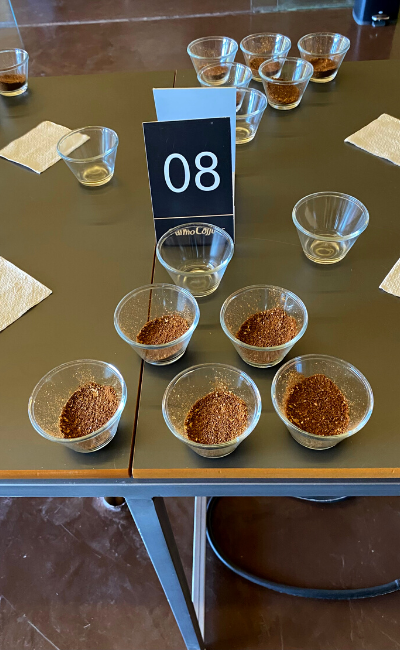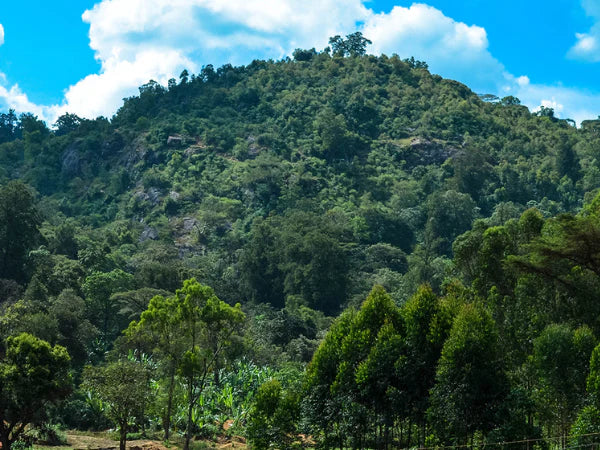Join our Green Coffee Buyer, Sam Klein, on his recent trip visiting the producer of our December 2022 Brazilian release!
This is our third and final release from this harvest, and like Santa Lúcia and Irmãs Pereira, it is a beautiful lot consisting entirely of yellow bourbon, a variety we've come to love for its sweet and mellow characteristics. Expect a nuanced but comforting cup with notes of vanilla, almond, fudge, and cherry.

Discover Santa Inês
Fazenda Santa Inês is one of several farms managed by the Sertão Group—who, together with CarmoCoffees, represent our oldest farm relationships in Brazil.
At 215 hectares, Santa Inês is exactly the size of Brooklyn's Prospect Park. About a third of the farm is planted with coffee and the rest is devoted to corn, soy, bananas, or Girolando cattle. A portion of the farm is preserved for native forest and wetland conservation.
Elevations on the farm range from 900 meters to 1,050 meters. While rather low in comparison with most other coffees on our menu, at 23º of latitude, the climate is more comparable to the highest elevation farms in Central America. The resulting warm daytime temperatures and cool nighttime temperatures promote the slow but complete maturation of coffee fruits, resulting in sweeter and more complex flavors in the cup.
Due to the farm's terrain, the entirety of its coffee production must be hand-picked. The farm employs around 35 staff who either live on the farm or in the nearby city of Olimpio de Noronha. In addition to their regular salary, the staff of Santa Inês and their families are provided with further assistance for necessities and benefits such as milk, coffee, medicine, and school transportation.


While Santa Inês grows several varieties—yellow and red bourbon, acaiá, catuaí, and catucaí—this lot is 100% yellow bourbon, the variety we've come to prefer in Brazil for its sweet and complex flavor profile.
This particular lot was honey processed—a term and method that's relatively uncommon in Brazil due to its similarity to the more ubiquitous pulped natural processing. First, coffee fruits are rinsed and sorted in a density sorting machine. Next, the coffee is depulped, leaving a certain amount of the sticky mucilage layer intact. The coffee is then moved to patios for drying, which typically takes about 18-25 days. The process preserves some of what we love about natural processed coffees from Brazil—heavy body, mellow acidity, sweet flavors of cocoa and chocolate—while theoretically reducing spoilage-related risks by speeding up the drying process.


Meet CarmoCoffees
I wasn't able to see Santa Inês on my recent trip to Carmo, but I was thoroughly impressed by the entire CarmoCoffees operation. A favorite experience I'd like to share was my visit to CriaCarmo—a social project supporting approximately 250 children ages 7-17 in Carmo de Minas. CriaCarmo sponsors activities such as swimming, soccer, dance, chess, and English.
One of the visions of CriaCarmo is to provide children with the language and critical thinking skills to succeed in the professional world—perhaps as future employees of CarmoCoffees (and therefore future colleagues of ours!). I was thrilled to learn that, through Cafe Imports, our yellow bourbon purchases already contribute to supporting CriaCarmo.
Ready for a cup of excellence?
Tasting Notes:
Vanilla, Almond, and Fudge
Regions:
Carmo de Minas, Mantiqueira de Minas, Minas Gerais
Producers:
Antônio José Junqueira Villela
SOURCE:
Fazenda Santa Inês







Leave a comment
This site is protected by hCaptcha and the hCaptcha Privacy Policy and Terms of Service apply.